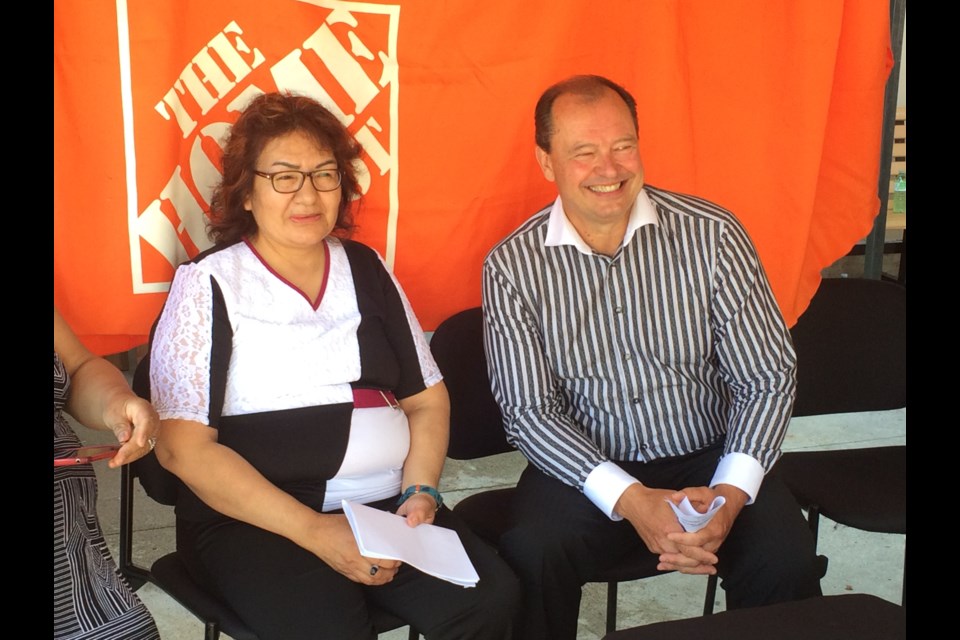The remote community of Whapmagoostui First Nation, also referred to as Great Whale First Nation, is the northern most Cree village in Quebec, situated in the subarctic coastal region between James Bay and Hudson's Bay. The average annual income for families in the community of 1,000 is between $15,000 and $35,000.
The community has just launched Helping Homes, a pilot project to deal with its housing crisis. It is designed to make owning a home more affordable and uses patented technology from a North Bay company, designed for energy efficiency. The goal is to minimize expensive diesel fuel consumption.
Project Coordinator, Peter Wynne explains that most of the families spend 70 percent of their income on food and shelter.
"So we've devised this concept to try and assist those that would probably never, ever realize having home ownership. The Band's perspective on it is to instill pride and build on self-esteem, and also to add a healing component to the project in dealing with social issues within the community."
Chief Louisa Wynne says her community faces a backlog for affordable housing, with many on the wait list living in over-crowded housing, which is creating social problems.
"Our goal is to find ways for our people to afford energy efficient housing, which would be a socioeconomic resolution for our people that are living in this situation," said Wynne."We are targeting people that are on the Income Security Program for this pilot project. About 35 percent of the community still go out on the land and practice the traditional ways of life, and these are the people that we're targeting. It will make the people who are selected very happy and proud homeowners."
Bryan Wynne, housing administrator, explains the Income Security Progam is primarily geared towards hunters and trappers.
"There's about 153 families on the program. Hopefully they will provide some equity by helping out with the project, and learning about why things were built they way they were. This is a new system so we're doing a training program right now with 14 candidates. We're building employability for our local people, so that way we're relying less on bringing people in from the south," said Wynne
The plan is to build two homes, each costing just under $250,000. The Band is trying to raise as much money, and get as much corporate sponsorship as it can, to bring down the cost and shorten the amortization period for the families.
Roxul Canada is the first corporate sponsor to get on board, providing environmentally friendly insulation which the project coordinator estimates will cover 33 percent of the cost of each home. Other companies like Home Depot have also stepped forward, offering assistance in various ways.
Ross MacLean, President of North Bay's SuperSHELL Homes, is preparing to travel to the remote community over the next few weeks to begin work on the project.
MacLean's company is helping launch the Helping Homes program by providing building materials and packages as well as construction services to build 'super energy efficient Net Zero Ready housing' and provide a skills training program.
SuperSHELL works on next generation building sciences to build more energy efficient homes.
MacLean says Brian Horsman and Associates, located in North Bay, provided the building designs.
"It's going to be a one and a half story, 1,400 square foot building. It will have 16 and a half inch walls, with R66 insulation in the walls, R80 in the ceiling, R28 in the foundation, so it's going to be very air tight and energy efficient," said MacLean. "Community members will learn how to do things like lay tile or do drywall so they can offset their hunting or trapping season."
Linda Job, member of the Taykwa Tagamou First Nation says the project mirrors Habitat for Humanity.
"Where the owners participate in the build but also we're going to provide some programs like house budgeting and maintenance."
Robert Wynne, Director General of Operations for Great Whale First Nation sees the potential for this pilot project to become more wide spread.
"I hope that in the future we will see more of these projects happening with First Nation communities because all across Canada there is a housing crisis in First Nation communities."
North Bay has a connection to the Great Whale community through education. Many of its members have attended school at Canadore College and Nipissing University, including Chief Wynne. At one time Canadore had over 400 students from the James Bay region. Some have gone on to marry members of the Nipissing First Nation.
"This is an opportunity for the city to assist them through a supportive perspective," said North Bay Mayor Al McDonald."Our local businesses are assisting so there's economic development from our side and from their side they need housing. They're diesel dependant for their heating so bringing more energy efficient homes up there actually reduces their carbon footprint."
The majority of the building materials will be transported by ship from Montreal to Great Whale First Nation. The build is scheduled to start in early September, when the weather is already similar to what North Bay experiences in late fall.



